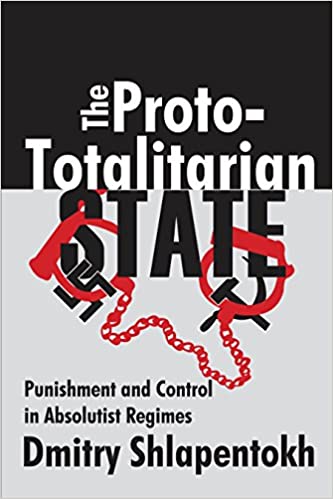Totalitarian rule is commonly thought to derive from spe- cific ideologies that justify the complete control by the state of social, cultural, and political institutions. The major goal of this volume is to demonstrate that in some cases brutal forms of state control have been the only way to maintain basic social order.Dmitry Shlapentokh seeks to show that totalitarian or semi-totalitarian regimes have their roots in a fear of disorder that may overtake both rulers and the society at large. Although ideology has played an important role in many totalitarian regimes, it has not always been the chief reason for repression. In many cases, the desire to establish order led to internal terror and intrusiveness in all aspects of human life.Shlapentokh seeks the roots of this phenomenon in France in the fourteenth to sixteenth centuries, when asocial processes in the wake of the Hundred Years War led to the emergence of a brutal absolutist state whose features and policies bore a striking resemblance to totalitarian regimes in the Soviet Union and China. State punishment and control allowed for relentless drive to "normalize" society with the state actively engaged in the regulation of social life. There were attempts to regulate the economy and instances of social engineering, attempts to populate emerging colonial empires with exiles and produce "new men and women" through reeducation. This increased harshness in dealing with the populace, in fact, the emergence of a new sort of bondage, was combined with a twisted form of humanitarianism and the creation of a rudimentary safety net. Some of these elements can be found in the democratic societies of the modern West, although in their aggregation these attributes are essential features of totalitarian regimes of the modem era.
چکیده فارسی
معمولاً تصور می شود که حکومت توتالیتر از ایدئولوژی های خاصی ناشی می شود که کنترل کامل نهادهای اجتماعی، فرهنگی و سیاسی توسط دولت را توجیه می کند. هدف اصلی این جلد نشان دادن این است که در برخی موارد، اشکال وحشیانه کنترل دولتی تنها راه حفظ نظم اجتماعی پایه بوده است. دیمیتری شلاپنتوک به دنبال نشان دادن این است که رژیم های توتالیتر یا نیمه توتالیتر ریشه در ترس از بی نظمی دارند. ممکن است هم حاکمان و هم جامعه را در کل پیشی گیرد. اگرچه ایدئولوژی در بسیاری از رژیم های توتالیتر نقش مهمی ایفا کرده است، اما همیشه دلیل اصلی سرکوب نبوده است. در بسیاری از موارد، میل به برقراری نظم منجر به وحشت داخلی و نفوذ در تمام جنبه های زندگی انسان شد. شلاپنتوک ریشه های این پدیده را در فرانسه در قرن های چهاردهم تا شانزدهم، زمانی که فرآیندهای اجتماعی در پی جنگ صد ساله منجر شد، جستجو می کند. به ظهور یک دولت مطلقه بی رحم که ویژگی ها و سیاست هایش شباهت زیادی به رژیم های توتالیتر در اتحاد جماهیر شوروی و چین داشت. تنبیه و کنترل دولتی به انگیزه بی امان برای «عادی کردن» جامعه با دولت که فعالانه در تنظیم زندگی اجتماعی درگیر است، اجازه داد. تلاشهایی برای تنظیم اقتصاد و نمونههایی از مهندسی اجتماعی، تلاشهایی برای پر کردن امپراتوریهای استعماری نوظهور با تبعیدیان و تولید «مردان و زنان جدید» از طریق آموزش مجدد وجود داشت. این سختگیری فزاینده در برخورد با مردم، در واقع، پیدایش نوع جدیدی از اسارت، با شکلی پیچ خورده از انسان دوستانه و ایجاد یک شبکه ایمنی ابتدایی ترکیب شد. برخی از این عناصر را میتوان در جوامع دموکراتیک غرب مدرن یافت، اگرچه در مجموع این ویژگیها ویژگیهای اساسی رژیمهای توتالیتر عصر مدرن هستند.
ادامه ...
بستن ...
Ebook details:
عنوان: The Proto-totalitarian State: Punishment and Control in Absolutist Regimes
نویسنده: Shlapentokh, Dmitry
ناشر: Routledge; 1 edition (December 15, 2006)
زبان: English
شابک: 0765803666, 978-0765803665
حجم: 1 Mb
فرمت: Original PDF
ادامه ...
بستن ...










